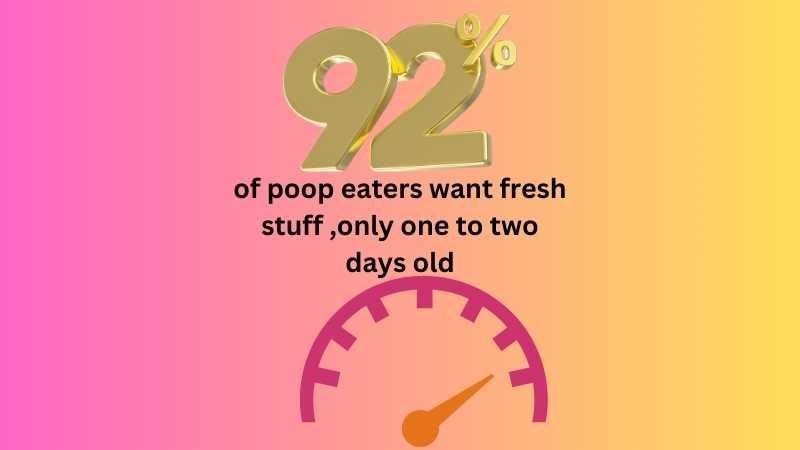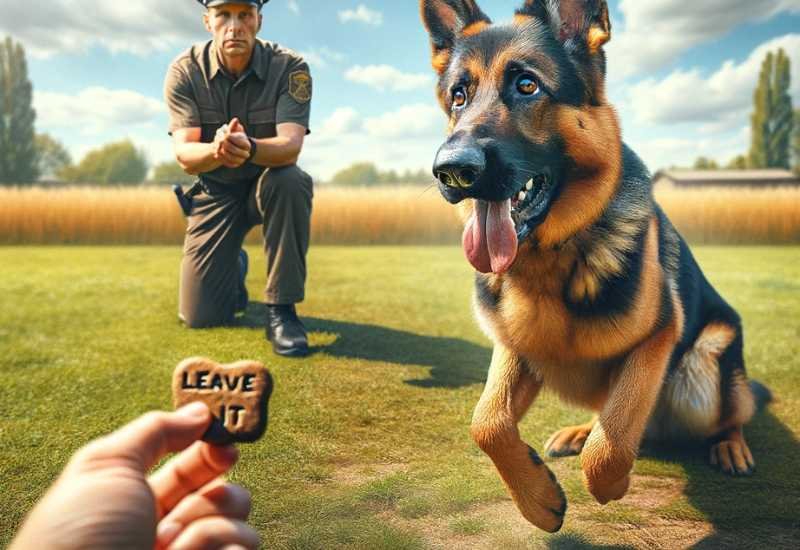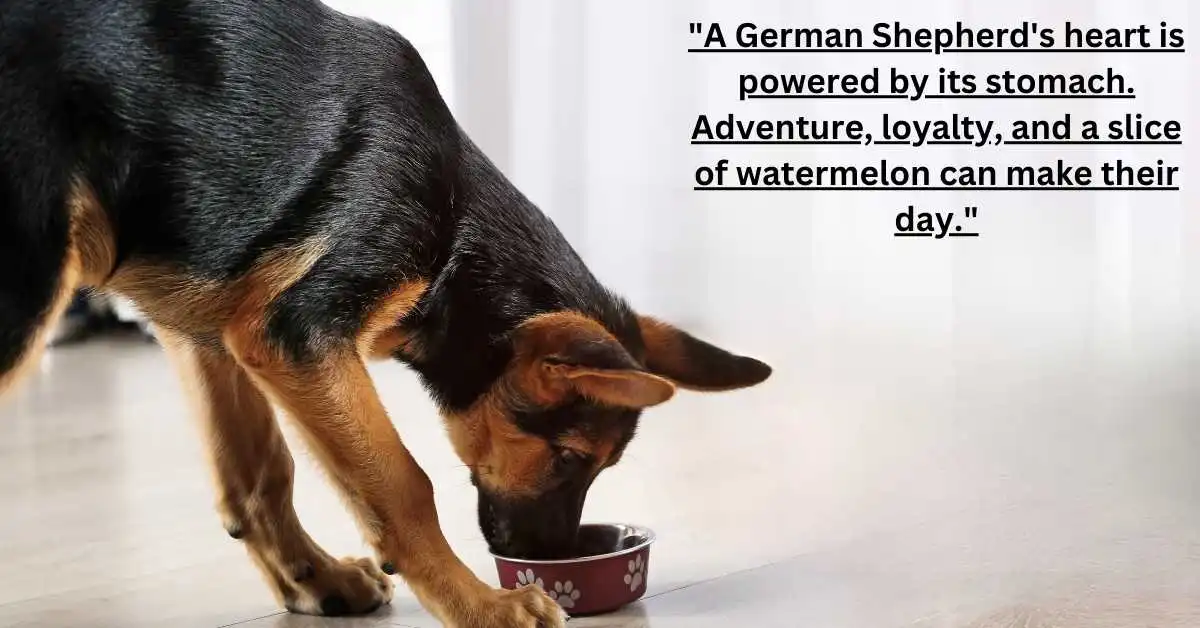First, let me assure you that if you’ve observed that your German Shepherd eats poop, it’s now not as huge of a deal as it would seem. I understand it’s easy to ignore when our puppies do such things as this, especially while we catch them sampling cat poop. You might also marvel, “Why does my German Shepherd eat poop?” and experience disgust, but it’s critical to recognize that this is ordinary conduct for dogs. Eating feces is called coprophagia, a common incidence among animals, with as many as 25% of dogs displaying this behavior sooner or later.
There could be a general reason why your German Shepherd has eaten poop. It could be due to stress, boredom, or anxiety. Sometimes, they might be trying to get extra vitamins or minerals they’re not getting from their food, especially if it’s poor quality. German Shepherds, like all dogs, use their sense of smell and taste as their hands to explore the world. It’s difficult for us to comprehend wildly when they’re kissing us in the face to greet us or holding objects like toys and balls in their teeth while playing.
Eating poop is just another approach for your dog to investigate out of curiosity. It’s usually safe, but it can sometimes make them sick. If you’re concerned about your German Shepherd eating poop, it’s always best to find out more about this strange dog behavior.
Is it normal for dogs to eat poop?
Yes, it is more common than you might assume. Coprophagia, the scientific term for poop consumption, isn’t as uncommon in dogs as one would possibly expect. A 2018 look published in Veterinarian Medicine and Science found that of the respondents, around 16% stated their dogs as common stool eaters who had been caught consuming poop at least six times, even as nearly 77% of the owners mentioned never seeing this behavior in their puppies.
So, why do dogs eat poop? One of the motives may be traced back to their ancestry. For example, nursing female dogs would possibly consume the feces of their infants to preserve the den. According to PetMD, another reason is probably that puppies, like different animals, including horses, see feces as a supply of nutrients.
However, PetMD warns that this behavior has to be discouraged as it exposes puppies to harmful microorganisms.
Why does my German Shepherd eat poop?
While it can be unsettling to have a look at, your German Shepherd eating his poop is a reasonably popular behavior among animals, including dogs. There are numerous reasons why your German Shepherd would engage in this act. One aspect will be the canine’s instinct.
In the wild, canines devour their feces to remove proof of their presence, lowering their chances of attracting predators. Another cause might be a loss of positive vitamins or dietary deficiencies. Consuming their poop can be an erroneous endeavor via your canine to top off these lacking nutrients.
If you’ve observed your German Shepherd displaying this behavior frequently, addressing it appropriately, which includes enhancing their weight loss plan or increasing intellectual stimulation to prevent boredom, is important. Remember, whilst it’s an expected behavior, frequent overall performance can lead to health troubles due to the capacity ingestion of dangerous microorganisms found in feces.

Diet
The dietary habits of your German Shepherd can be a significant factor in the practice of coprophagia. An unbalanced diet or low-quality dog food lacking essential nutrients might be causing your dog to seek those nutrients in their stool. Consider improving their diet or introducing pet-friendly nutrient supplements.
Drugs
Certain veterinary medications can alter your dog’s taste buds or increase their appetite, causing them to consume feces. If your German Shepherd started eating poop after beginning a new medication, you may want to consult your vet about potential side effects and solutions.
Stress
Stress and anxiety can lead to many abnormal behaviors in dogs, including eating feces. If your dog changes their environment or routine, they may respond by using this behavior as a coping mechanism. Provide a safe, calm, and stable environment for your pet.
Instinct
In the wild, dogs often consume their feces as a natural survival instinct to prevent predators from detecting their presence. While domesticated dogs no longer need these instincts, they may still display this behavior out of a hard-wired impulse.
Anxiety
Anxiety can cause a range of erratic behaviors in dogs, including coprophagia. If your pup is eating poop out of nervousness or fear, it’s crucial to identify and deal with the root cause of their anxiety to alleviate the symptoms.
Diabetes
Medical conditions like diabetes can increase your dog’s appetite, leading them to seek out other food sources, including feces. Regular vet checkups can help diagnose and manage such health issues proactively.
Boredom
Dogs often resort to undesirable behavior when they’re bored or don’t get enough mental stimulation. If your German Shepherd is eating poop out of boredom, try increasing their playtime, exercise, and mental stimulation.
Parasites
Parasites can rob your dog of essential nutrients from their food, causing them to eat feces to regain lost nutrients. Regular deworming and fecal tests can help keep parasites in check.
Malabsorption Syndrome
If your pet suffers from malabsorption syndrome, they may be unable to absorb nutrients from their food. This can cause them to eat feces to get more nutrients. Consult a vet if you suspect your dog has malabsorption issues.
Did you know?
Like many other dogs, German Shepherds have a peculiar preference regarding feces consumption. A surprising 92 percent of poop eaters gravitate towards the ‘fresh stuff’ that is only one to two days old.
This preference can significantly reduce the chance of the dog keeping its environment clean, a trait many dog owners desire. Seeing your German Shepherd indulge in such habits can be distressing, but understanding this behavior from the canine’s perspective can provide peace of mind.
It’s crucial to remember that, for them, this instinctual behavior doesn’t carry the same negative connotations as it does for us.
Why does my German Shepherd eat other dog’s poop?
My German Shepherd has quite an unsettling habit—he eats other dogs’ feces. At first, I was perplexed: why on earth would my adult dog develop such peculiar behavior? But after thorough research, I discovered he might be searching for nutrients. Like many animals, dogs can identify nutrient-rich sources, even if they come in unpleasant forms such as feces.
This behavior is particularly prevalent when their current diet is deficient in nutrition. So, if you notice your German Shepherd showing a similar interest in other dogs’ or even other animals’ poops, it might be a sign to reassess their diet. You should promptly contact a veterinarian to discuss possible dietary adjustments or supplements to help fulfill their nutritional needs.
Why does my German Shepherd eat cat poop?
Your German Shepherd may consume cat poop due to the high protein content that cat feces often contain. Cats’ diets are typically protein-rich; some of this nutrition may remain in their waste, attracting dogs like German Shepherds. A lack of essential nutrition in their diet could also be blamed for this behavior. Although it may seem harmless, it’s crucial to remember that this behavior can be dangerous.
Cat feces may harbor parasites, harmful bacteria, or even diseases like salmonella, posing significant health risks to your dog. The best way to keep your German Shepherd away from cat poop is by teaching them the ‘leave it’ or ‘no’ commands. Training your dog to follow these commands can help prevent them from engaging in this unsavory and potentially harmful practice.
‘Recall’ or ‘Leave It’ Your German Shepherd
Training your dog to respond to “recall” or “leave it” commands can be effective. This training helps create a mental association between the command and the desired behavior, whether returning to your side or ceasing a particular action.

Keep Your Dog on the Leash
Keeping your German Shepherd on a leash during walks gives you control and prevents your dog from eating feces. This is particularly beneficial in the early stages of training, where your dog may still be working to master commands.
German Shepherd Dogs Need a Muzzle
While it may seem harsh, using a muzzle can prevent your German Shepherd from eating poop while you work on training. Ensure the muzzle is comfortable and does not cause distress or harm to your dog.
Reward Good Behavior
A powerful tool for training dogs is positive reinforcement. Rewarding your German Shepherd for avoiding feces or responding to commands can reinforce the desired behavior.
Distract Your Dog
Diverting your dog’s attention can prevent them from engaging in undesirable behaviors. Toys, play, or other distractions can prevent your dog from eating feces.
Always Pick Up Your Dog’s Poop
Regularly cleaning up after your dog can help control this behavior. Removing access to feces can prevent your German Shepherd from eating them.
Give More Attention to Your Dog
If your dog is eating poop as a cry for attention, spending more time with them and providing more mental stimulation may help curb this behavior.
Change Diet
If your German Shepherd’s current diet is not providing the necessary nutrients, they may eat feces in search of them. Reevaluating their diet and making necessary changes can help address this issue.
Try with Unpleasant Food
Using taste-aversion products can make feces taste unpleasant to your German Shepherd, discouraging them from eating it. Always consult your vet before introducing new products to your dog’s routine.
How do I clean my German Shepherd’s mouth after they’ve eaten poop?
Cleaning your German Shepherd’s mouth after they’ve indulged in their poop dinner must become a routine. Fun and easy ways include using a canine dental care kit or dog-friendly mouthwash. Committing time to this ensures a cleaner mouth and promotes your dog’s overall health. It’s best to consult your vet to identify the most suitable cleaning methods for your furry friend.
Feeding Your German Shepherd
To keep your German Shepherd healthy and deter them from eating poop:
- Provide balanced meals at regular intervals.
- Ensure the meals are packed with the necessary nutrients.
- Always keep fresh water available to keep your dog hydrated.
Cleaning Around Your German Shepherd’s Mouth
After your German Shepherd has eaten poop, sweep the area around their mouth with a clean, damp cloth. This procedure helps to wipe away any residual fecal matter and prevents further ingestion during grooming.
Maintaining Dental Hygiene of Your German Shepherd
Use specially designed dog toothbrushes and toothpaste to clean your German Shepherd’s teeth after eating feces. Regular brushing helps to kill harmful bacteria, ensuring your dog’s mouth stays clean and healthy.
Providing Dental Sticks for Your German Shepherd to Chew On
Offer your German Shepherd a dental stick to chew on after eating poop. These sticks aren’t just enjoyable for your dog; they also help to scrape away any remaining feces particles, promoting oral hygiene.
Maintaining a Positive Attitude toward your German Shepherd
While it’s normal to feel frustrated when your German Shepherd eats poop, it’s crucial to refrain from punishing them. Instead, focus on redirecting the behavior. Dogs respond better to positive reinforcement than to punishment.
Why does my German Shepherd poop so much?
Excessive pooping in your German Shepherd could be indicative of several issues. Generally, dogs should produce approximately the same mass of poop as the food they consume. If you’re noticing your German Shepherd pooping far more than what they’re eating, it’s a likely clue that something isn’t quite right.
This could result from a dietary imbalance, digestive issues, or an underlying health condition. It’s essential to monitor your dog’s bowel movements, and if you’re concerned about their frequency, it’s best to seek advice from a veterinarian.
What could be causing your German Shepherd to poop too much?
Viruses and bacteria
- Too much food
- It is not the correct type of food.
- Sudden change in diet
- Unfamiliar surroundings
- Stress or depression
- Your dog sneaks food from you when you aren’t looking
- Loud music
- Colitis (inflammation)
Why does my German Shepherd have loose stools?
Loose stools in your German Shepherd can be problematic and indicate various potential health problems. Just as when your German Shepherd is pooping too much, the frequency and texture of their stool can provide vital clues about their overall health. It’s important to know that dogs should generally produce roughly the same stool mass as the food they consume.
So, if you observe that your German Shepherd has far more stool than the amount of food they’re eating, or if the stool is particularly loose or difficult to pick up, these are probably signs that something isn’t quite right. This general rule can help you better understand and monitor your dog’s digestive health. If you notice any drastic changes in your dog’s bowel movements, don’t hesitate to consult with a veterinarian.
- Lean protein
- White rice
- Potatoes
- Canned pumpkin
- Prescription dog food
- Dog food for sensitive stomachs
The German Shepherd dog I own still eats poop despite everything I’ve tried.
If you’ve tried everything and your German Shepherd dog still eats poop, it might be time to call in the experts. While the Internet is a great place to find helpful information, it can’t replace the personalized advice and examination a veterinarian can provide.
This behavior could be attributed not just to poop from other animals but also to other factors that could be affecting your dog’s health. Your vet can perform the necessary tests and guide you on the best course of action to correct this behavior. Remembering that your dog’s health should be a top priority is always crucial. Visiting your vet is highly recommended when dealing with persistent issues like this.
Final words
In conclusion, it’s understandable to feel worried if you see your German Shepherd eating poop. Although distasteful, this behavior is standard in dogs. However, it’s best not to ignore it as it may lead to health issues. The best way to solve this problem often involves a proper diet, increased attention, and consistent training. Regular vet checks and professional advice are invaluable in ensuring your dog’s well-being.
Patience and consistency are key when introducing new behaviors or diet changes to your German Shepherd. Stay positive and focus on the end goal—a healthy and happy pup.
FAQs
While hunger could be a reason, dogs eating poop, also known as coprophagia, can often be attributed to various factors such as health issues, dietary deficiencies, or behavioral quirks. It’s best to consult with a vet to identify the underlying cause.
Is there a vitamin my dog should take to stop eating poop?
To deter your dog from eating poop, your vet may recommend specific vitamins such as B vitamins, digestive enzymes, or probiotics. However, it’s crucial to consult with a vet before starting any new supplement regimen for your dog.
